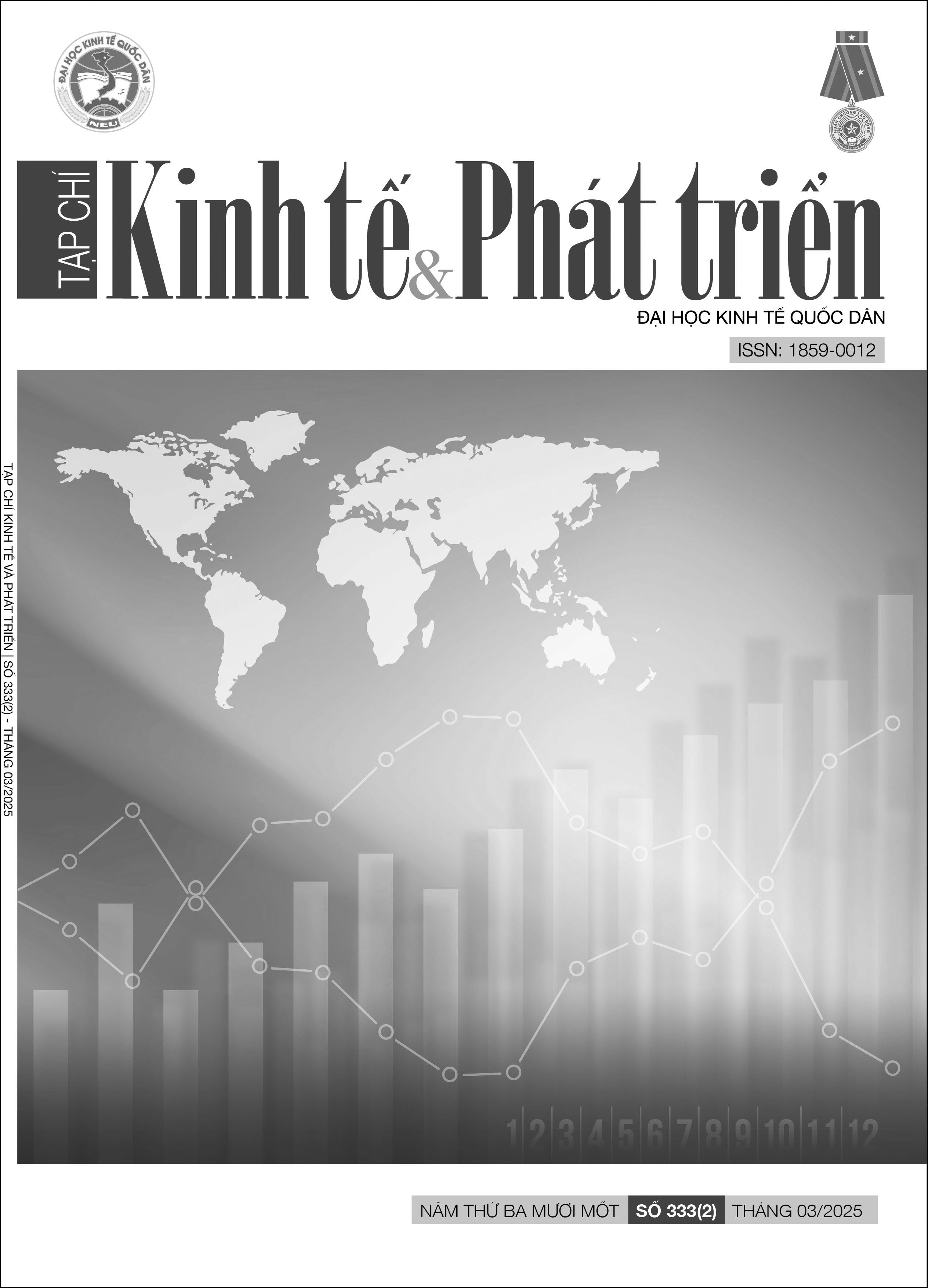Tác động của năng lượng, kinh tế biển, kinh tế xanh đến mục tiêu trung hòa các-bon tại Việt Nam
DOI:
https://doi.org/10.33301/JED.VI.2161Từ khóa:
Kinh tế biển, kinh tế xanh, năng lượng, phát thải ròng bằng 0, trung hòa các-bonTóm tắt
Bài báo phân tích tác động của năng lượng, kinh tế xanh và kinh tế biển đến lượng phát thải CO₂ tại Việt Nam, nhằm hỗ trợ mục tiêu phát thải ròng bằng không vào năm 2050. Sử dụng dữ liệu chuỗi thời gian từ năm 2000 – 2021 và mô hình phân phối trễ từ hồi quy (Autoregressive Distributed Lag, ARDL), nghiên cứu làm rõ mối quan hệ ngắn hạn và dài hạn giữa cường độ năng lượng, năng lượng tái tạo, đổi mới sáng tạo, tài trợ kỹ thuật, nghề cá và thương mại đại dương với phát thải CO₂. Kết quả cho thấy, trong ngắn hạn, năng lượng tái tạo và đổi mới sáng tạo giúp giảm phát thải, còn cường độ năng lượng, tài trợ kỹ thuật và thương mại đại dương làm tăng phát thải. Về dài hạn, tài trợ kỹ thuật góp phần giảm phát thải CO₂, nhưng đổi mới sáng tạo và thương mại đại dương lại làm tăng phát thải do mở rộng hoạt động kinh tế. Nghiên cứu khuyến nghị kiểm soát chặt chẽ đổi mới công nghệ và thương mại biển hướng tới phát triển bền vững.
Tài liệu tham khảo
Algarvio, H. (2021). The role of local citizen energy communities in the road to carbon-neutral power systems: Outcomes from a case study in Portugal. Smart Cities, 4(2), 840-863. https://doi.org/10.3390/smartcities4020043.
Ben Jebli, M. & Belloumi, M. (2017). Investigation of the causal relationships between combustible renewables and waste consumption and CO2 emissions in the case of Tunisian maritime and rail transport. Renewable and Sustainable Energy Reviews, 71, 820–829. https://doi.org/10.1016/j.rser.2016.12.108.
Chien, F., Hsu, C.C., Sibghatullah, A., Hieu, V.M., Phan, T.T.H., & Hoang Tien, N. (2022). The role of technological innovation and cleaner energy towards the environment in ASEAN countries: proposing a policy for sustainable development goals. Economic research-Ekonomska istraživanja, 35(1), 4677-4692. https://doi.org/10.1080/1331677X.2021.2016463.
Cao, Y., Qi, F., & Cui, H. (2023). Toward carbon neutrality: a bibliometric analysis of technological innovation and global emission reductions. Environmental Science and Pollution Research, 30(29), 73989-74005. https://doi.org/10.1007/s11356-023-27684-w.
Damanpour, F., & Aravind, D. (2012). Managerial innovation: Conceptions, processes and antecedents. Management and Organization Review, 8(2), 423-454. https://doi.org/10.1111/j.1740-8784.2011.00233.x.
Fratila, A., Gavril, I.A., Nita, S.C., & Hrebenciuc, A. (2021). The importance of maritime transport for economic growth in the European Union: A panel data analysis. Sustainability, 13, 7961. https://doi.org/10.3390/su13147961.
Hannan, M.A., Lipu, M.H., Ker, P.J., Begum, R.A., Agelidis, V.G., & Blaabjerg, F. (2019). Power electronics contribution to renewable energy conversion addressing emission reduction: Applications, issues, and recommendations. Applied Energy, 251, 113404. https://doi.org/10.1016/j.apenergy.2019.113404.
IPCC (2018). IPCC special report: global warming of 1.5 C. https://www.ipcc.ch/site/assets/uploads/2023/06/SR15_Citation.pdf.
Liu, F., Khan, Y., & Marie, M. (2023). Carbon neutrality challenges in Belt and Road countries: what factors can contribute to CO2 emissions mitigation?. Environmental Science and Pollution Research, 30(6), 14884-14901. https://doi.org/10.1007/s11356-022-22983-0.
Ozer, M., Canbay, S. & Kirca, M. (2020). The impact of container transport on economic growth in Turkey: An ARDL bounds testing approach. Research in Transportation Economics, 88, 101002. https://doi.org/10.1016/j.retrec.2020.101002.
Pandey, N., de Coninck, H., & Sagar, A.D. (2022). Beyond technology transfer: Innovation cooperation to advance sustainable development in developing countries. Wiley Interdisciplinary Reviews: Energy and Environment, 11(2), e422. https://doi.org/10.1002/wene.422.
Phạm Quyết Thắng & Nguyễn Thị Thanh Huyền (2024). Con đường hướng tới phát thải ròng bằng 0: kinh nghiệm quốc tế và bài học cho Việt Nam. Tạp chí Kinh tế và Phát triển, (329 (2)), 50-58. https://doi.org/10.33301/JED.VI.1974.
Sarwar, S., Waheed, R., Aziz, G., & Apostu, S.A. (2022). The nexus of energy, green economy, blue economy, and carbon neutrality targets. Energies, 15(18), 6767. https://doi.org/10.3390/en15186767.
Taghvaee, S.M., Omaraee, B., Taghvaee, V.M. (2017). Maritime transportation, environmental pollution, and economic growth in Iran: Using dynamic log-linear model and granger causality approach. Iranian Economic Review, 21, 185–210. https://doi.org/10.22059/ier.2017.62100.
Xu, L., Fan, M., Yang, L., & Shao, S. (2021). Heterogeneous green innovations and carbon emission performance: evidence at China’s city level. Energy Economics, 99, 105269. https://doi.org/10.1016/j.eneco.2021.105269.
Wang, M., & Feng, C. (2022). Tracking the inequalities of global per capita carbon emissions from perspectives of technological and economic gaps. Journal of Environmental Management, 315, 115144. https://doi.org/10.1016/j.jenvman.2022.115144.
Wan, X., Li, Q., Qiu, L., Du, Y. (2021a). How do carbon trading platform participation and government subsidy motivate blue carbon trading of marine ranching? A study based on evolutionary equilibrium strategy method. Marine Policy, 130, 104567. https://doi.org/10.1016/j.marpol.2021.104567.
Wan, X., Xiao, S., Li, Q., Du, Y. (2021b). Evolutionary policy of trading of blue carbon produced by marine ranching with media participation and government supervision. Marine Policy, 124, 104302. https://doi.org/10.1016/j.marpol.2020.104302.
Zhou, X., Zhao, X., Zhang, S., Lin, J. (2019). Marine ranching construction and management in East China Sea: Programs for sustainable fishery and aquaculture. Water, 11, 1237. https://doi.org/10.3390/w11061237.
Yi, M., Liu, Y., Sheng, M. S., & Wen, L. (2022). Effects of digital economy on carbon emission reduction: New evidence from China. Energy Policy, 171, 113271. https://doi.org/10.1016/j.enpol.2022.113271.





